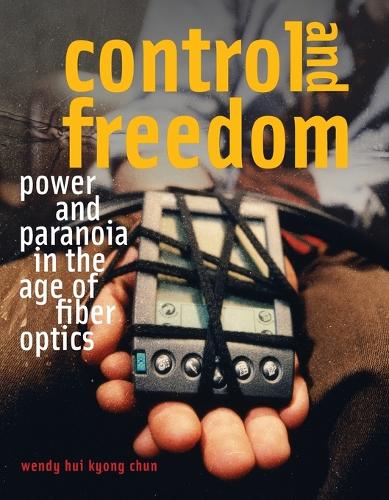
Control and Freedom: Power and Paranoia in the Age of Fiber Optics
(Paperback)
Publishing Details
Control and Freedom: Power and Paranoia in the Age of Fiber Optics
By (Author) Wendy Hui Kyong Chun
MIT Press Ltd
MIT Press
26th September 2008
United States
Classifications
Professional and Scholarly
Non Fiction
Cultural studies
Internet guides and online services
Digital and information technologies: social and ethical aspects
302.231
Physical Properties
Paperback
368
Width 178mm, Height 229mm, Spine 16mm
590g
Description
A work that bridges media archaeology and visual culture studies argues that the Internet has emerged as a mass medium by linking control with freedom and democracy.How has the Internet, a medium that thrives on control, been accepted as a medium of freedom Why is freedom increasingly indistinguishable from paranoid control In Control and Freedom, Wendy Hui Kyong Chun explores the current political and technological coupling of freedom with control by tracing the emergence of the Internet as a mass medium. The parallel (and paranoid) myths of the Internet as total freedom/total control, she says, stem from our reduction of political problems into technological ones. Drawing on the theories of Gilles Deleuze and Michel Foucault and analyzing such phenomena as Webcams and face-recognition technology, Chun argues that the relationship between control and freedom in networked contact is experienced and negotiated through sexuality and race. She traces the desire for cyberspace to cyberpunk fiction and maps the transformation of public/private into open/closed. Analyzing "pornocracy," she contends that it was through cyberporn and the government's attempts to regulate it that the Internet became a marketplace of ideas and commodities. Chun describes the way Internet promoters conflated technological empowerment with racial empowerment and, through close examinations of William Gibson's Neuromancer and Mamoru Oshii's Ghost in the Shell, she analyzes the management of interactivity in narratives of cyberspace. The Internet's potential for democracy stems not from illusory promises of individual empowerment, Chun argues, but rather from the ways in which it exposes us to others (and to other machines) in ways we cannot control. Using fiber optic networks-light coursing through glass tubes-as metaphor and reality, Control and Freedom engages the rich philosophical tradition of light as a figure for knowledge, clarification, surveillance, and discipline, in order to argue that fiber-optic networks physically instantiate, and thus shatter, enlightenment.
Reviews
"Control and Freedom is the most theoretically rich, deftly written, and historically grounded treatment of race in cyberspace to date. In this fine and enjoyable book, Chun traces the intermedial connections between online and offline representations of race and gender. This is a lucid, rigorous, and fascinating critical analysis of new media." Lisa Nakamura, Assistant Professor of Communication Arts and Visual Culture Studies, University of Wisconsin-Madison "Katherine Hayles' Writing Machines is a major addition to the scholarship on hypertext and, in general, on the relation of technology to literature. As this volume so clearly demonstrates, Hayles is a subtle reader of texts, a knowledgeable critic of new technology, and a fine theorist of culture. The combination here results in an outstanding piece of writing. I am certain readers of Writing Machines will place it near the top of their list of books on hypertext."--Mark Poster, University of California, Irvine "*New Philosophy for New Media* is a major contribution to the question of digital media and art. Unlike too many other writers on the subject, Hansen is able to approach his topic in relation to the most profound efforts of the philosophical tradition and his highly original take on the question is one that recognizes the media specificity of the digital in its novelty while insisting on the continuing importance of the body in the practice of new media art.The book pursues its thesis of the place of the human in face of digitized information in a rigorous, systematic manner."--Mark Poster, University of California, Irvine "*Control and Freedom* is the most theoretically rich, deftly written, and historically grounded treatment of race in cyberspace to date. In this fine and enjoyable book, Chun traces the intermedial connections between online and offline representations of race and gender. This is a lucid, rigorous, and fascinating critical analysis of new media."--Lisa Nakamura, Assistant Professor of Communication Arts and Visual Culture Studies, University of Wisconsin - Madison "*Control and Freedom* makes a major contribution to our understanding of digital media and networked society. Chun offers up a refreshing and much-needed challenge to the core assumptions of Lev Manovich's *The Language of New Media*, moving beyond that book's insistent formalism toward a more contextualized understanding of the difference that a medium makes. Her book also breaks free of the tired old binary of techno-euphoria vs. techno-phobia, challenging popular assumptions that the computer is either empowering and transparent or a relentless surveillance machine."--Tara McPherson, University of Southern California "*Getting Under the Skin* is a major contribution to the debate over the relation of new media to the human body. Wegenstein argues convincingly against both the humanist defense of the body against the 'abstractions' of mediated communication and against those who would 'upload' their consciousness and leave their 'meat' behind. Instead, she invents a third path that sees the body as always already mediated. With great theoretical subtlety she explores the dialectic of the body and media from the Surrealists and Situationists, installation art, and experimental body performances to new media artists and architects. Wegenstein sheds striking new light on the all-important question of the relation of humans to information machines."--Mark Poster, University of California, Irvine
Author Bio
Wendy Hui Kyong Chun, who has studied both systems design and English literature, is Professor of Modern Culture and Media at Brown University. She is the author of Control and Freedom- Power and Paranoia in the Age of Fiber Optics and Programmed Visions- Software and Memory, both published by the MIT Press.
